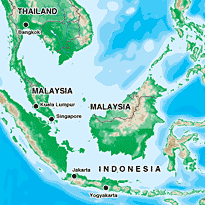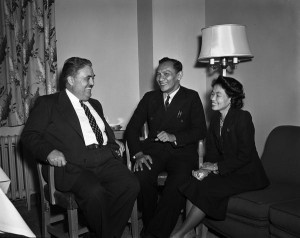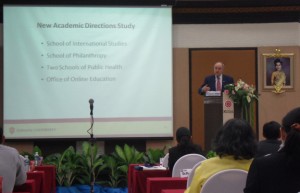IU and Thailand: Historic ties, new opportunities
Our first day in Bangkok provided important moments of reflection on IU’s long-standing ties to Thailand, stretching back to 1948 when IU President and Chancellor Herman B Wells met with H E Mom Luang Pin Malakul, the Permanent Under Secretary for Education in the Ministry of Education, in Bloomington. The two conversed about higher education and other development matters in Thailand, a topic to which President McRobbie returned in his address today at The National Institute of Development Administration (NIDA).
Today’s visit by President McRobbie is particularly special because of IU’s role in the establishment of NIDA in 1966. In the early 1960s, Thai officials began to conceptualize a new curriculum in developmental administration that would prepare graduates to respond to the social and political context of national development needs. To support the creation of this new institute, the Ford Foundation awarded a multi-year technical assistance grant to the Midwest Universities Consortium for International Activities, of which IU was one of the five founding member universities. Because IU had worked with NIDA’s predecessor, the Institute of Public Administration at Thammasat University in Bangkok, it was chosen as the lead institution. Over the next decade, with funding support from the Ford Foundation, twenty five staff members completed advanced degrees at IU and other U.S. universities.
The continued presence of IU in Thailand was apparent at today’s talk by President McRobbie: Many of the educational leaders from NIDA and other Thai institutions in attendance today were IU alumni.
President McRobbie began his address on the “Challenges of Higher Education Administration in the Next Decade” by first reflecting on the long-standing relationship between Indiana University and Thai institutions, starting with IU’s earliest involvement in the inception of the Institute of Public Administration at Thammasat University in 1955, a project sponsored by the Agency for International Development through the U.S. Foreign Operations Administration. In the years since, he emphasized, “IU’s partnership with Thai universities has yielded a generation of senior-level Thai administrators, including a number of college presidents, who have received advanced training at Indiana University. It has led to stronger teacher education and public administration programs within Thailand.”
While Indiana University has been engaged internationally for decades, President McRobbie underscored the broader challenges for American higher education within today’s international economy. “Within this global context,” he posited, “the world’s colleges and universities must share the world’s burden in addressing the most important global issues of our time, such as trade, energy, information technology, access to water resources, and population movement.”
To illustrate IU’s approach in this new global context, President McRobbie described each of the five key components of IU’s international plan:
- Encouraging our students to study abroad and creating opportunities for them to do so—study abroad is a critical component of any student’s education;
- Recruiting highly-qualified international students to Indiana University;
- Promoting and supporting global connections for faculty research;
- Developing global bilateral partnerships with peer and complementary teaching and research institutions; and
- Pursuing international outreach and service in the form of institution-building.
In particular, he emphasized the importance of the latter for IU. Although the university has demonstrated successes around the world, he reminded attendees that such endeavors require “a realistic understanding of strengths and our ability to deliver,” as well as careful planning to ensure that projects are suited to our interests and expertise.
He concluded with brief comments about some of the new initiatives that IU is pursuing, the result of a study that examined the changing needs of students and faculty in today’s increasingly globalized world:
- The development of a School of International Studies to build on IU’s expertise in areas studies and foreign languages
- The establishment of a School of Philanthropy, based on IU’s internationally acclaimed Center on Philanthropy
- The establishment of Schools of Public Health on IU’s Bloomington and Indianapolis campuses that reflect their respective academic strengths on health issues
- The creation of an Office of Online Education to oversee the development and coordination of online education at IU
Following his talk, President McRobbie presented NIDA President Dr. Sombat Thamrongthanyawong with the Thomas Hart Benton Medallion, the higher honor that a president of Indiana University can bestow on a person external to the university. Dr. Sombat, the first graduate in the doctoral program in Public Administration at NIDA, began his teaching career at NIDA in 1989 and rapidly ascended to the rank of professorship as a result of his outstanding research. He has also been recognized in Thai society for his service on a number of important boards and organizations. He has served as a member of the National Housing Authority, the Thai Maritime Navigation Company, and the Forest Industry Organization. He currently serves as the chair of the Secondary Mortgage Coprporation and as a member of the National Legislative Assembly of Thailand. As a junior student at Kasetsart University, he received a medal for academic excellence from His Majesty the King. He went on to receive his bachelor’s degree in science from Kasetsart and was named the university’s “Alumnus of the Year” in 2005. In 2008, he was named “Alumnus of the Year” by NIDA.
Tags: development, Indonesia, international, NIDA






